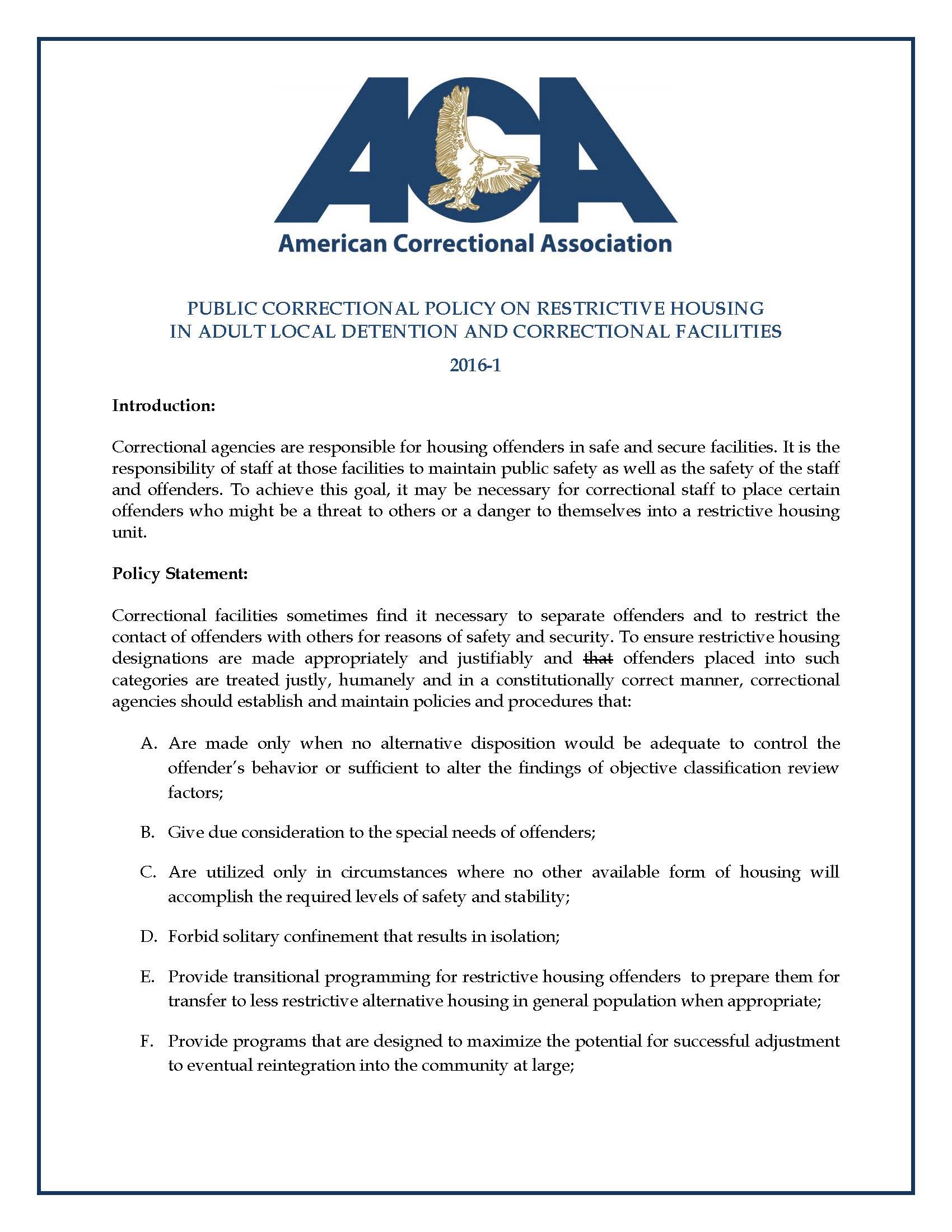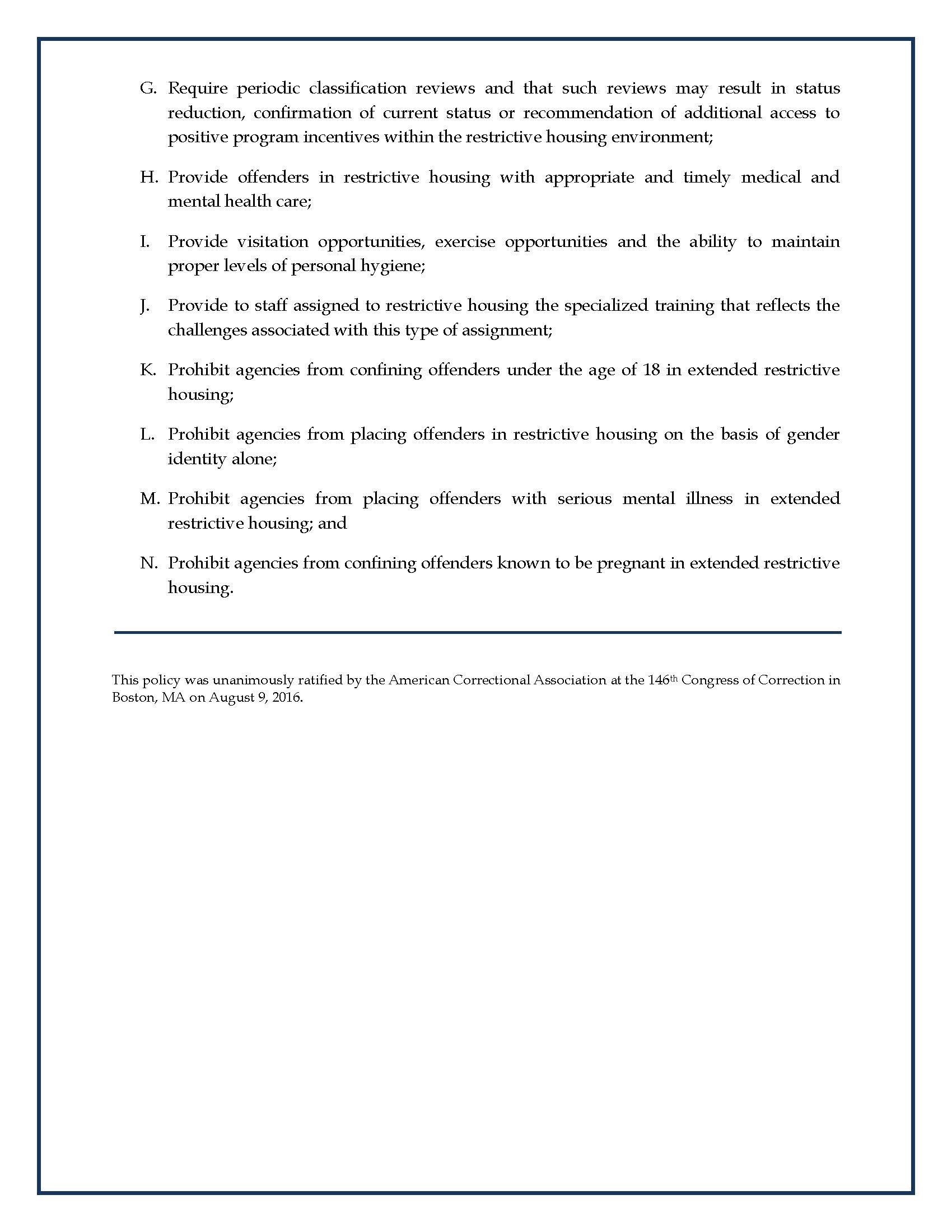Included here within is a very important statement on Restrictive Housing by the American Correctional Association. The text of the initial letter to members is available below – for the full 5 page document, please see the images below.
For further information and context please refer to the “American Correctional Association Restrictive Housing Performance Based Standards - August 2016” located on the ACA website (69 pages).
American Correctional Association
206 N. Washington Street, Suite 200 ♦ Alexandria, VA 22314 703-224-0000 ♦ www.aca.org
August 23, 2016
To ACA Members,
As you know, we recently concluded our 146th Congress of Correction in Boston, Massachusetts. The staff wanted to share with you a few very significant outcomes from our conference. The governing bodies of ACA have adopted a new resolution and a new policy of great consequence. We also approved for field testing a set of standards regarding the use and administration of restrictive housing units.
The resolution is Supporting the Repeal of the Exclusion Clause in Section 1 of the Thirteenth Amendment of the U.S. Constitution.
We believe the 'Exclusion Clause' to be grossly inconsistent with current and sound correctional practice, current societal norms and basic human decency. The Thirteenth Amendment provides that, "neither slavery nor involuntary servitude, except as punishment for crime whereof the party shall have been duly convicted, shall exist within the United States." ACA adamantly decries the historical applicability of slavery or involuntary servitude as acceptable punishment for those convicted of crimes. The association believes that periods of incarceration should be utilized to provide activities that promote pro-social behaviors, community integration and economic status through work education, vocational training, counseling, medical, mental health care and restorative justice programs.
ACA's Code of Ethics says "it expects of its members unfailing honesty and respect for the dignity of human beings," so to should our nation's founding document. Corrections professionals have a special responsibility to protect from harm those who are involuntarily under our care and control. I'm sure you would agree that periods of incarceration as a criminal sentence are punishment in themselves. They are not and should never be used FOR punishment. However, as the Constitution currently reads, slavery would be allowed in correctional settings and even the Virginia Supreme Court reaffirmed in 1872 that prisoners are 'slaves of the state'. This needs to be changed!
ACA hopes that you will join with us in an effort to amend the Constitution and thereby repeal the 'Exclusion Clause' !
Secondly, ACA has approved restrictive housing standards for field testing and a policy based on those standards - Public Correctional Policy on Restrictive Housing in Adult Local Detention and Correctional Facilities
Since 2012 when the Senate Judiciary held its first hearing: Reassessing Solitary Confinement, the ACA has been leading the charge to reform the use and administration of restrictive housing units in corrections. We are proud to announce that we have approved for field testing a set of expected practices or standards to eventually be used by ACA in the auditing and accreditation process for both prisons and jails.
The standards, which are performance based, have a strong mental health component and include a definition for serious mental illness. For the purposes of these standards, ACA's work going forward, and any guidance we should put out to the correctional field, restrictive housing has been defined as "a placement that requires an inmate to be confined to a cell at least twenty-two hours per day for the safe and secure operation of the facility."
Among the new standards for adoption are: specific requirements for the timely and regular review of restrictive housing placements by administrative and treatment staff; strict adherence to written policies and procedures by staff working in restrictive housing units; inmate access to institutional services and programming; and the implementation of graduated programs designed to facilitate release from restrictive housing. The policy adopted by ACA is a reflection of these standards and promotes a new ideology in corrections related to the use of restrictive housing.
It has always been and remains a primary purpose and objective of ACA to develop and adopt sound correctional policies, practices and procedures for the corrections profession. We do so proudly with input from dozens of state, national and international chapter and affiliate organizations, thousands of members from all around the world and in all facets of the corrections profession.
Should you have any questions about the resolution, policy or the standards, please do not hesitation to contact Eric Schultz, Director of Government & Public Affairs at (703) 224-0106 or erics@aca.org, Jeff Washington at (703) 224- 0103 or jeffwAaca.org. The full set of standards has been posted to the ACA website for your review.
Sincerely,
James A. Gondles, Jr.
Executive Director
(Return to the cover of the 2016 AAJ Journal Q3 issue)





(Return to the cover of the 2016 AAJ Journal Q3 issue)